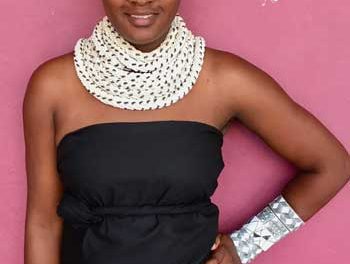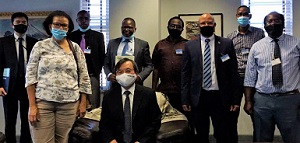
Young mothers graduate from livelihood training

40 young mothers completed a three-week livelihood training at Lidar Community Centre in Katutura, on 29 November, supported by the United Nations Population Fund (UNFPA) and the Government of Japan.
The training sought to promote sexual and reproductive health and rights (SRHR) of young mothers through livelihood skills training and information sharing on gender-based violence, (GBV) and SRHR.
Japanese Ambassador to Namibia, His Excellency Hisao Nishimaki said the skills gained during training will contribute to these young people’s resilience to deal with and overcome setbacks that life throws at them by diversifying their livelihood systems. “I hope the tangible outcome of this project will further strengthen Japan-Namibia relations and continue to benefit the people of Namibia,” he added.
He congratulated the new graduates on their achievements, emphasizing that Japan remains committed to assisting Namibia in the spirit of building resilience and contributing to livelihood upliftment efforts for the people of Namibia.
Zelda Swartbooi, a mother of three who participated in the training said no problem can not be solved if you have your hands as a woman, and if you have your mind and energy, you can do better things in life. “Thank you for changing our lives for the better. We no know we can wake up and empower other young ladies,” she added.
The UNFPA said Zelda’s heartfelt words underscore the tangible impact that investing in the lives of young mothers can have and that the training not only equipped young mothers with practical skills but also instilled self-confidence, sisterhood, and a sense of independence in these women. “The ripple effect of an empowered mother can go beyond individual lives, contributing to the broader goal of creating a more resilient and empowered community in Namibia,” they added.
They further highlighted that graduation was a milestone moment for the young mothers, who are all under the age of 25, as they are now able to establish their income-generating businesses with the various skills they have gained in numerous areas including cooking, baking, housekeeping, entrepreneurship as well as information on GBV and SRHR.
“The 40 mothers, most of whom became mothers as teenagers, graduated with starter kits that included a mini oven, mixing bowls, baking trays, baking ingredients, and measuring spoons. Providing a strong foundation upon which these women can collectively build their small businesses, thereby improving and enhancing their living conditions and those of their families,” they emphasised.
They said statistics show that the impact of gender-based in Namibia extends to economic and developmental setbacks, including absenteeism, loss of work days due to illnesses, and hospitalizations. “Insufficient economic and livelihood opportunities, coupled with lack of information on safe migration, render young women and girls susceptible to human trafficking and commercial sexual exploitation. Approximately 32% of adolescent girls aged 15 to 19 and 35% of young women aged 20 to 24 have encountered physical violence from a partner,” they concluded.













































